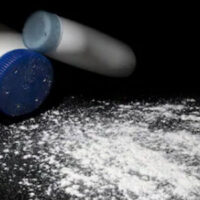Johnson & Johnson Recalls Baby Powder After FDA Finds Asbestos

Johnson & Johnson continues to face thousands of talcum powder lawsuits related to its popular baby powder products. Most of these lawsuits have focused on scientific evidence connecting the use of talcum powder by women to ovarian cancer. But there are a growing number of cases that also point to the link between baby powder and asbestos-related diseases.
While Johnson & Johnson has long denied its products contain asbestos, the company itself was recently forced to recall a lot of its Johnson’s Baby Powder after it tested positive for asbestos fibers. On October 18, 2019, the U.S. Food and Drug Administration (FDA) announced that its laboratories found “chrysotile fibers” in Johnson’s Baby Powder lot #22318RB. According to the World Health Organization (WHO), chrysotile is one of six known forms of asbestos, and any level of exposure can lead to the development of cancer in the lungs, ovaries, and larynx.
The FDA noted that when talc–the main ingredient in Johnson & Johnson’s Baby Powder–is mined, it can be contaminated with asbestos if the mining site is not “selected carefully” or if the proper “steps are not taken to purify the talc ore.” The FDA was careful to point out, however, that not all talc products sold in the U.S. contain asbestos, and the agency regularly tests all cosmetic products to ensure they are talc-free.
CVS, Other Major Drug Retailers, Pull Baby Powder from Shelves
In its recall announcement, Johnson & Johnson insisted it was acting “out of an abundance of caution,” and that all of its talc “comes from ore sources confirmed to meet our stringent specifications that exceed industry standards.” And while the company did not directly dispute the FDA’s findings with respect to the asbestos-contaminated lot of baby powder, it nevertheless insisted it “[c]annot confirm if cross-contamination of the sample caused a false positive.”
Unfortunately for Johnson & Johnson, many of its retail partners were not reassured by these protests of safety. On October 24, drugstore giant CVS said it would “remove and halt the sale of all 22 ounce Johnson & Johnson baby powder products,” not just those subject to the recall. As reported by Forbes, CVS’ action followed similar decisions by Walmart and Rite Aid.
Forbes also reported that just 13 days before the FDA found asbestos in the contaminated lot, Johnson & Johnson CEO Alex Gorsky testified under oath in a deposition that he “unequivocally” believed that his company’s talcum powder “does not contain asbestos.” Gorsky reportedly made these statements as part of a lawsuit brought by an Indiana man who developed cancer, allegedly as the result of using Johnson & Johnson’s talc products.
Speak with a Tennessee Talcum Powder Lawsuit Attorney Today
Johnson & Johnson’s unequivocal denials notwithstanding, the FDA’s testing has provided yet more evidence of the serious health risks of using talcum powder. If you, or someone in your family, has cancer and you suspect that Johnson & Johnson’s products may be responsible, you should speak with a qualified talcum powder lawsuit lawyer as soon as possible. Contact the office of Fox, Farley, Willis & Burnette, today if you need immediate assistance.
Sources:
fda.gov/news-events/press-announcements/baby-powder-manufacturer-voluntarily-recalls-products-asbestos
jnj.com/johnson-johnson-consumer-inc-to-voluntarily-recall-a-single-lot-of-johnsons-baby-powder-in-the-united-states
forbes.com/sites/lisettevoytko/2019/10/23/report-johnson–johnson-ceo-believed-baby-powder-was-asbestos-free-13-days-before-fda-found-trace-levels/
who.int/ipcs/assessment/public_health/chrysotile_asbestos_summary.pdf
https://www.foxandfarleylaw.com/reuters-johnson-johnson-knew-of-asbestos-in-talc-for-decades/











